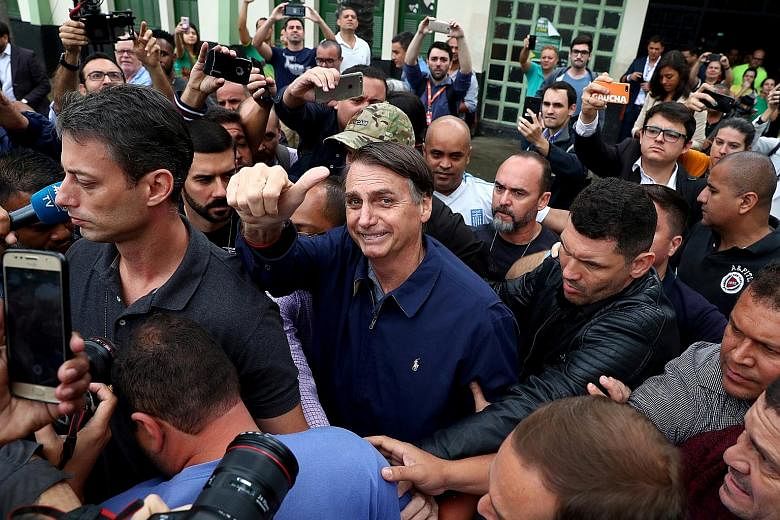United States President Donald Trump appears set to gain a soulmate and admirer after Mr Jair Bolsonaro, a far-right, hitherto-fringe politician who models himself on the US leader, won 46 per cent of the ballots in the first round of voting in Brazil's presidential election on Sunday.
And Mr Bolsonaro seems likely to win the presidency when the second round is held on Oct 28.
His tally, far bigger than initially expected, represents an astonishing rebuke to Brazil's existing politicians and a warning for the rest of Latin America of what happens when voters lose faith in an entire political class.
Brazil, Latin America's biggest economy, is struggling with the worst recession in the country's two centuries of history, with 13 million people currently out of work.
It also suffers from a massive crime wave fuelled by poverty, the drugs trade and organised criminal gangs; a record 63,800 murders were reported last year.
But the biggest problem is a catastrophic collapse in governance as the result of a massive corruption scandal involving Petrobras, Brazil's huge majority-state-owned oil company, and kickbacks to prominent members of the ruling centre-left Workers' Party.
Ms Dilma Rousseff, elected as Brazil's first female president in 2010, was impeached and driven out of power in August 2016 as a result of this scandal; Luiz Inacio Lula da Silva, her predecessor and the man who presided over Brazil's transformation into a thriving economy during the previous decade, is now in jail.
According to the Brazilian Institute of Public Opinion and Statistics, 87 per cent of voters distrust all politicians.
-
87%
-
Percentage of voters in Brazil who distrust all politicians, according to the Brazilian Institute of Public Opinion and Statistics.
Although Mr Fernando Haddad, the 53-year-old Workers' Party presidential candidate in Sunday's election, served as mayor of Rio de Janeiro and is respected, he paid the price for his party's scandals and proved no match for Mr Bolsonaro.
Mr Haddad polled 29 per cent of the ballots, or 31 million votes, while Mr Bolsonaro got 49 million votes, or 46 per cent of the total cast in this 210 million-strong nation.
A charismatic former paratrooper, Mr Bolsonaro, 63, has succeeded in using his fringe status to portray himself as the only candidate untainted by corruption and has endeared himself by offering apparently simple solutions to Brazil's ills.
He promises to "change the destiny of Brazil" by shoving aside an entire generation of Workers' Party officials. And he hints at the possibility of extrajudicial killings in order to stop criminal gangs.
"There are certain types of people who aren't humans," he told an electoral rally, implying that such people can just be liquidated.
Mr Bolsonaro has often been dismissive of women, claiming they should not receive equal pay since "they tend to get pregnant".
He also praised the military dictatorship which ruled Brazil from the 1960s to the 1980s, and has attracted strong support from the armed forces and the Church.
His stabbing last month by a far-left activist who claimed to be on "a mission from God" only increased his popularity. After losing almost 40 per cent of his blood in the assassination attempt, he made no further public appearances but, like Mr Trump, proved adept at using social media platforms to address his growing electoral base.
In his first reaction to Sunday's electoral results, delivered on Facebook Live rather than at an anticipated press conference, he claimed that he would have won the first round vote outright were it not for the electronic voting system. "We have received many complaints of (electronic) voting systems that have had problems," he said.
Still, he proclaimed himself confident of total victory on Oct 28, claiming that Brazil faces only two futures: his path of "prosperity, freedom, family and God" or "the path of Venezuela", a country now bankrupted by a Marxist regime.
In theory, Mr Haddad, the centre-left candidate who also qualified for the second round of voting, can still defeat Mr Bolsonaro by attracting all the ballots which went to smaller centrist candidates in the first round. Yet, this will be a very tall order never achieved before in national politics.
Populist right-winger Bolsonaro claims inspiration from Mr Trump on everything from closing Brazil's borders to immigrants to slashing bureaucracy and liberating private enterprise from government controls. But he has no government experience, no record as a liberal economist and has offered nothing but slogans about how he will rule the country.
Still, many Brazilians seem unperturbed. For they see in Mr Bolsonaro the only way to put an end to a political system which evidently failed.


